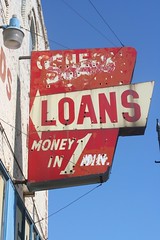
This article was written by John from Home Loan Finder. Visit Home Loan Finder to compare home loan interest rates.
None of us can claim to have an emergency-free life, yet our approach towards an emergency fund or a contingency fund is often casual, even foolhardy. According to a survey conducted by MetLife in 2009, less than half the American population had succeeded in putting aside a month’s worth of expenses for emergencies. Most people were under the illusion that their monthly paycheck would be sufficient to cover all sorts of expenses-planned as well as unplanned.
Given the negligent attitude towards emergency funds most of us have, it’s safe to say that the topic requires closer scrutiny. Here is our guide to gathering a great emergency fund.
What is an Emergency Fund?
Although one would think that the term ‘Emergency Fund’ would be self explanatory, it’s amazing how people get it wrong. The best explanation is that it is a stash of cash you access only when you’re in dire straits; read: major financial difficulties. However, it must be noted that buying a new car is not an emergency, nor is that renovation you’ve been hoping to do for ages. We’re talking a real emergency; that is an unexpected occurrence that requires immediate action. Maybe the tiles got blown off the roof in a storm and the roof needs repairing, the washing machine broke and you need to call a plumber, or there’s a medical emergency and you live in an area that required you to pay up front. Having a contingency fund allows you to sail through the difficult times with ease and peace of mind.
Pay off Debts or Save for Emergencies-Whichever Comes First?
Although it is important to make sure your debts are covered every month, it is equally as important to make sure you put something away for emergency situations. Granted, it’s difficult to rationalize if you are paying upwards of 15 percent interest, especially if you know the money you¢re putting aside will accumulate dismal returns by languishing in a bank account. But there’s no getting away from the fact that life’s emergencies will not wait for you to pay off your debts. They can hit anytime, and without warning. Not having an emergency fund means you’ll either have to syphon off money earmarked for other uses or fall back on the plastic. This, in turn, will lead to more debt; bringing you right back to where you started off. An emergency fund will help break this vicious cycle.
How Much Do I Need to Put Aside?
Each family has its own specific needs which can be calculated by taking stock of the monthly expenses. To start, go over the bills of the last three months and work out a monthly average of all your expenses. This would include mortgage/rental payments, money spent on utilities, groceries, and insurance premiums, as well as other expenses such as payment for car loans, petrol and travel. Once you have a figure, aim for three to six months’ worth of savings in the bank-three, if there are two earning members in the family and six for households that have a single earner.
Getting Started
The first step to saving money is often the hardest. The best way to feel at ease with starting an account is to think of how you’d feel if something went wrong and you couldn’t find the cash to pay for it. What would you do? Now remember that feeling of near panic, and think on it every time you doubt why you’re putting money aside. Depositing a few hundred dollars into a high interest savings account is a great start. If you can’t afford that, start with $50 a month and increase the deposit amount every month until you’ve got a nice little fund gathering some interest.
Finding the Extra Money
Typically, the average person will try and cut back on expenses in some way to be able to route a little into an emergency fund-if they have one! However, there are a lot of people who just don’t find limiting their spending that easy. For them, the next course of action would be finding a way of increasing your earnings. This could either be done by working overtime or getting a second source of income. A second income does not necessarily mean finding another job; you could have a garage sale or auction off belongings on one of the many online trading sites, too.
Where Should I Stash All This Cash?
Hiding it under the floor boards is no longer an advisable option, for a number of reasons. These days, depositing the money in some sort of account is the best way to manage your fund. There are a number of options to consider, but when you’re comparing accounts, the main thing to remember is that you’ll need to be able to access the funds quickly. This will narrow your account type search. Term deposit accounts often offer high interest rates, but many have lock-in periods, meaning you can’t access your money until after a specified period. Look for high interest accounts with no fixed term, or major fees.
It Makes Good Sense
People are more successful when it comes to investing in retirement plans or pensions for the simple reason that the money is deducted directly from their paychecks. In addition, there are penalties and taxes in place, if you wish to withdraw the money early. Therefore, it makes sense to treat your contribution towards the emergency fund as a monthly expenditure. It requires you to discipline yourself, forego a few small pleasures, and make tiny sacrifices, but it all builds up towards adding security and stability in the future. Denying yourself and your family that cushion would be a mistake.
John, CleverlyChanging.com really appreciates your strong commitment to sharing good sound financial advice. We sincerely thank you!





